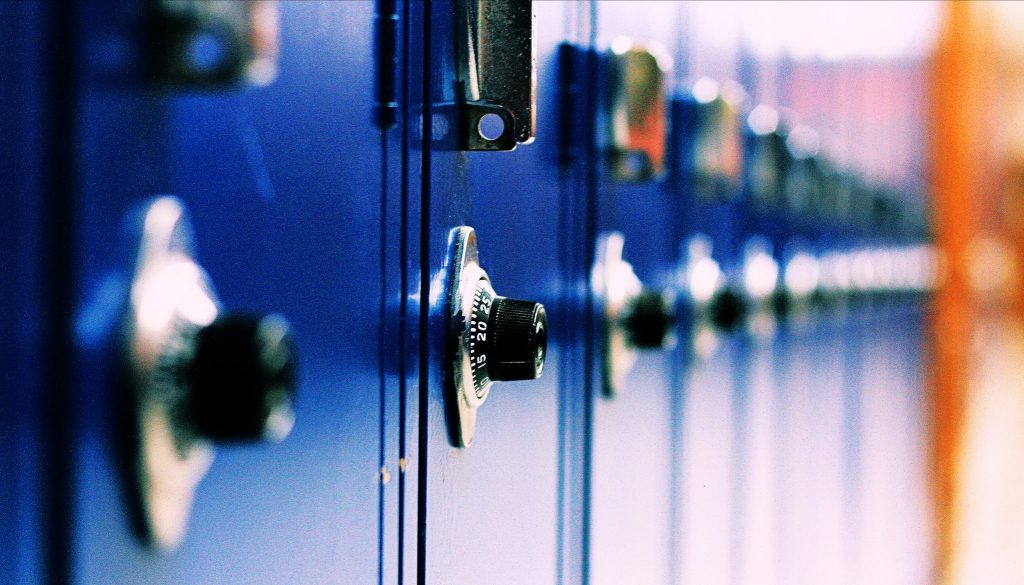Republican Bill Changes How Wisconsin Pays for Voucher Schools
Backers say 'decoupling' will save taxpayers money, report disputes this.

School lockers. Photo by Phil Roeder (CC BY 2.0)
Legislative Republicans plan to bring back a proposal that would pay for the state’s school voucher program separately from how it funds the public school system.
Under a “decoupling” bill, school vouchers would be funded from the state’s General Purpose Revenue rather than from the combination of state aid and local property taxes that fund them now.
Advocates say decoupling would give people property tax relief and potentially lead to increased state funding for public schools.
But a report from the Wisconsin Association of School Business Officials released last month said the change could result in more vouchers and a surge in costs in the state budget.
“Decoupling proposals … would obscure the state and local fiscal impacts of the program and impede crucial public scrutiny of private voucher costs at the local level,” researcher Anne Chapman writes in the report.
The nonpartisan Legislative Fiscal Bureau estimates decoupling would save property taxpayers more than $342 million. General Purpose Revenue, or GPR, also comes from taxes, but it’s a wider pool that includes individual income taxes, sales and use taxes, and corporate income taxes.
A bill to decouple funding was first introduced in 2023. It passed 64-35 in the Assembly but failed in the Senate.
State Rep. Jessie Rodriguez, R-Oak Creek, told WPR a nearly identical bill is currently being crafted.
Rodriguez said decoupling won’t be a Hail Mary pass thrown in at the end of this year’s budget negotiations or used as a quid pro quo with the Department of Public Instruction.
“During the time leaders tried to negotiate with the governor on the budget over the last couple of weeks, this was brought up to him, and he wouldn’t give any commitments,” Rodriguez said. “We’ve decided at this point to just do a standalone bill and pass it out of the [Legislature] and send it over to him to hopefully get his support.”
Gov. Tony Evers’ office referred questions on decoupling to his previous responses.
During a recent interview with WisconsinEye, Evers said he probably wouldn’t support it.
“I’ll have to take a look at it,” Evers said. “The implications of that are somewhat breathtaking. If there are different people in charge, the choice schools would suddenly get more money than the public schools, and that is unacceptable.”
Decoupling is already happening in Milwaukee
Wisconsin’s voucher programs include the Milwaukee Parental Choice Program, the Racine Parental Choice Program, the Wisconsin Parental Choice Program and the Special Needs Scholarship Program.
The four programs were started at different times, with the first in the nation being the Milwaukee program that started 35 years ago.
The Milwaukee choice program was originally funded with state General Purpose Revenue, then it shifted to state and local cost sharing. In 2015, it shifted back to GPR funding, but that shift is happening slowly over 12 years. The Milwaukee choice program will be fully funded by GPR in 2027.
Decoupling would move all four programs to that formula.
Rodriguez said lawmakers are considering whether to move the programs over slowly, like Milwaukee, or make the switch immediately.
“We haven’t finalized how we would do it, but essentially, we don’t want it to hurt the school districts,” she said. “Usually, what the public school districts do is levy through property taxes the aid that they lost to the choice and charter students. If we do what is currently state law in the Milwaukee program, the property owners would not see an increase in their property taxes for choice and charter students in their communities.”
Chapman, with the Wisconsin Association of School Business Officials, points out that if school funding changes, it would make public schools the only K-12 schools imposing an explicit cost on local residents through property taxes. But taxpayers would still have to pay for the cost of voucher schools through income and sales taxes that fund the state budget.
Cathy Olig, who heads the Southeastern Wisconsin Schools Alliance representing 26 public school districts, said decoupling doesn’t address educational resources for public school students.
“It is unfortunate to hear that lawmakers are discussing an alternate funding model for voucher schools when they haven’t provided a solution to fund public schools other than local taxpayers,” Olig said.
Forward Analytics recently published a report showing that decoupling would have saved local property taxpayers $337 million this year. But that expense would have been shifted to $343 million in additional state funding.
Still, report author Dale Knapp believes changing school financing is the right move.
“This isn’t about whether choice is good or bad or somewhere in between. It’s strictly about if we’re going to have these programs how do we fund them,” Knapp said. “And I think by choosing the way that we’ve funded them, we’ve created a disservice for property tax payers.”
Legislative Republican proposal would change how Wisconsin pays for voucher schools was originally published by Wisconsin Public Radio.
If you think stories like this are important, become a member of Urban Milwaukee and help support real, independent journalism. Plus you get some cool added benefits.





















public funds for public school!
The legislature has NEVER adequately funded public schools in this state- but they have plenty of OUR money to give to sectarian, for-profit businesses masquerading as schools. Wake up, Badgers!
this just further obfuscates where money comes and goes to, removes/reduces oversight, makes it easier to move around and delete funding, etc.
Say ‘no’ to this junk legislation.